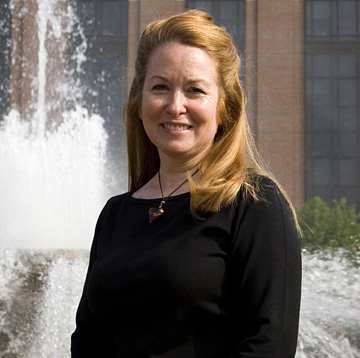Kisselburgh named Butler Center's first faculty scholar

Lorraine Kisselburgh, assistant professor of communication and the first faculty scholar for the Susan Bulkeley Butler Center for Leadership Excellence. (Photo provided)
Lorraine Kisselburgh, assistant professor of communication, has been named the first faculty scholar for the Susan Bulkeley Butler Center for Leadership Excellence. The appointment provides research support to Kisselburgh, who focuses on the intersection of women, leadership, and the science and mathematical fields.
Kisselburgh was chosen for the position because of the relevance of her work to the mission of the center, says Beverly Davenport Sypher, vice provost for faculty affairs and chair of the Susan Bulkeley Butler Center for Leadership Excellence.
"The Butler Center focuses on research that helps broaden inclusion and advance leadership capacity, especially among women and underrepresented faculty," Davenport Sypher says. "Not only does Dr. Kisselburgh's research help further this mission, but we also have the opportunity to support the research of a female faculty member."
Kisselburgh's research focuses on gender, work and careers, with a particular concentration on underrepresentation and marginalization. She is particularly interested in women in STEM careers (science, technology, engineering and mathematics). Her interest in STEM careers was piqued during her time as a practicing professional in the computer science and technology field.
"While I was studying and practicing in the field, I wondered why other women didn't have an interest in a subject I found absolutely fascinating," Kisselburgh says. "As a doctorate student, this question drove me to explore some of the mechanisms that create gender disparity in STEM fields.”
When she joined the faculty in 2008, Kisselburgh began research on cultural, developmental, and technological factors that shape women's interest in STEM careers. She is currently studying career aspirations and choices of young children and women in China, India, Europe and the Middle East. She also studies gender dynamics in technology environments, including gaming and online collaboration settings.
In addition to her work on STEM careers, Kisselburgh also focuses on portrayals of women in leadership positions. Working with an undergraduate research intern, she is using image and essay analysis to uncover patterns in how young women interpret what is meaningful to them about work, role models and their inspirations.
The findings from this work can be useful in understanding career aspirations, but they also have practical interest to those who might translate this information into images and messages, Kisselburgh says.
"Identifying how leadership and STEM careers are perceived by young women today is essential to understanding why they aren't equally represented in these fields," Kisselburgh says. "In this way, my research aligns with the mission of the Butler Center. I am grateful to the center for being so gracious in supporting my research."
In addition to supporting faculty research, the Susan Bulkeley Butler Center for Leadership Excellence is also a resource for female faculty interested in building a network of campus contacts. On Friday (March 2), the center will hold its second annual Distinguished Women Scholars event, which honors Purdue alumnae who have become distinguished in their respective fields. For more information on this event and other programming, visit www.purdue.edu/butler.
